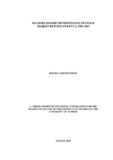| dc.description.abstract | Debate on the stochastic behaviour of stock market returns, the macroeconomic
variables and their cointegrating residuals remains unsettled. There is also no
unanimity in the nature of relationship between stock market returns and the
macroeconomic variables. Furthermore, the moderating effect of events such as
the 2008 Global Financial Crisis on the relation between stock market returns
and the macroeconomic variables has attracted very little attention. The
purpose of this study was to examine the stochastic properties of stock market
returns, exchange rate, inflation rate, interest rate and their cointegrating
residuals. The study also determined the relationship between the
macroeconomic variables and stock market returns. It equally investigated the
moderating effect of the 2008 Global Financial Crisis on the relation between
the macroeconomic variables and stock market returns. The study used
monthly data from the Nairobi Securities Exchange, Central Bank of Kenya,
and Kenya National Bureau of Statistics from 1st January 1993 to 31st
December 2015. It employed the Auto-Regressive Fractionally Integrated
Moving Average to determine the integration orders of the variables and the
cointegrating residuals. The study also used an Auto-Regressive Distributed
Lag cointegration test to establish cointegration between the macroeconomic
variables and stock market returns. An interaction modelling was adopted to
investigate the moderating effect of the 2008 financial crisis on stock market
returns with the data being split into pre-crisis period, crisis period; and post-
crisis period. Results indicate that all the variables and the cointegrating
residuals are fractionally integrated. This implies that shocks to them are highly
persistent but eventually dissipate. It also suggests that when each of the
macroeconomic variables is driven away from stock market returns, new and
undesirable long-run equilibriums might be established if active policy
interventions are not undertaken. Stock market returns lead interest rate and
month-on-month nflation rate in the short run. This implies that a thriving
stock market aids in realizing a macroeconomic stability. The macroeconomic
variables are jointly cointegrated with stock market returns with both measures
of inflation rate being positively related to stock market returns in the long run.
This suggests that investors in the stock market are cushioned from rising
inflation rate. A unit increase in exchange rate and inflation rate depresses
stock market returns after compared to before the Global Financial Crisis. This
implies that policymakers and stock market regulators need to be extra cautious
when intervening in the activities of the stock market, especially after
turbulences. This thesis is the first to empirically examine fractional
cointegration between the macroeconomic variables and stock market returns
in Kenya. It is also the first study to examine the moderating effect of the 2008
financial crisis on the relation between the macroeconomic variables and stock
market returns in Kenya. | |



